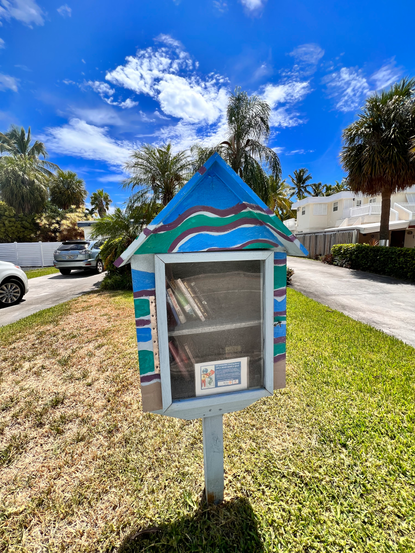Libraries are an old institution. There were libraries hundreds of years ago when monks painstakingly and manually copied scrolls and books. These manuscripts belonged to the church and only trained priests could read and write. During the Enlightenment, libraries and books belonged to the aristocracy. Private libraries and collections grew in popularity and showcased someone’s status. During the political upheavals of the 21st century, books become a symbol for universal suffrage, rights, and education. The idea was free access to libraries and books provided equal opportunity. This opportunity belonged to all people: not one race, sex, ethnicity, or socioeconomic class.
As years go by, library professionals attempt to extend the reach of services and books to every corner of society. Many ideas are innovative and creative, and the purpose is to make libraries and library books accessible.
One such idea is the Little Free Library. Little Free Library is a non-profit organization, dedicated to expanding book access, building community connections, and inspiring readers. The principle behind this initiative is to provide 24/7, free book access through book-sharing boxes created by local communities for the local community. These literal boxes vary in size, shape, and design, but they all have one thing in common: they require no key or pass-code. They are free of any boundary. In this construction, they are promoting accessibility and bringing books to every corner of a society.
Through the motto: “take a book, leave a book”, the supply of books is unlimited. Individuals throughout the community can leave books they are finished with in the book box for other members of their community to enjoy and share.
Creating a Little Free Library can be done in a variety of ways. Via the Little Free Library website, you can purchase a book box (all payments go towards the non-profit’s upkeep and mission) and decide upon a steward who will manage and promote the book box. However, you can always build your own book box! If you do this, you can purchase your charter sign and registration via the Little Free Library website. Registering your book box will enable you to promote your library via the mobile app and web map (if you purchase your box via Little Free Library, registration comes included).
At the end of the day, you do not need the Little Free Library to create a book box and share the joys of reading with your community. However, Little Free Library is a successful non-profit that can assist your community if more support is needed.

Communities that are under-served or in need of assistance can apply for the Impact Library Program, and the Little Free Library will construct and register a book box for no-cost. 60% of Impact libraries are servicing children, and 83% of participants say their libraries are within communities that have limited book access. Similar to this program is the Indigenous Library Program, where book boxes are created for no-cost within tribal communities across the country.
In the United States, two out of three children do not have books of their own at home, and more than 30 million adults cannot read or write above a third-grade level. These numbers correspond with poverty-stricken and under-served communities. In a democracy, your socio-economic status should not determine your accessibility to books or a fair education. However, in our country, this is too often the case. Little Free Libraries can assist in this literacy and education crisis.
As I travel across the country, I am astounded by the number of Little Free Libraries I come across. In almost every state park I stayed in, there was a lending library. Throughout small towns and major cities, I see book boxes and the Little Free Library charter sign. Not only do Little Free Libraries connect community members together, they also build strong connections between various communities. Through the love of books, reading, and learning, people can see firsthand how linked we all are through stories and basic human needs. There can be unlimited growth through these tiny boxes of books. In my experience with them on the road, it can help promote various cultures through travel and promote diversity and equity through exploration.
One of our founding fathers, Thomas Jefferson, believed an educated citizenry was the key to a successful democracy. Abraham Lincoln, a self-educated man through books, once said, “A capacity and taste for reading gives access to whatever has already been discovered by others. It is the key, or one of the keys, to the already solved problem. And not only so, it gives a relish and facility for successfully pursuing the yet unsolved ones.”















Comments